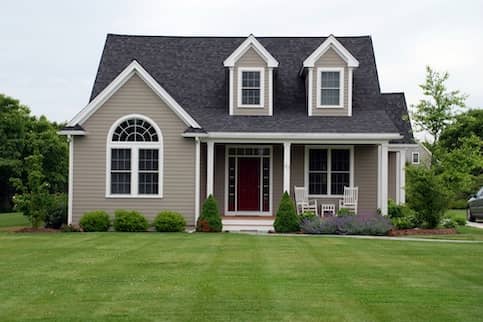As a homeowner you likely have an expectation that, aside from being a place to live, your house is also an investment — that it will appreciate in value and realize a profit when it’s sold years down the line.
But there is another, more immediate, way that your home can be a money maker, and it’s called house hacking. So what is house hacking and how can you implement this increasingly popular real estate strategy and start generating income today?
House Hacking: A Closer Look
House hacking is a real estate term used to describe generating passive income from renting out a piece of your property while living there yourself. This can mean anything from renting a room in your house to purchasing a multifamily home and living in one of the units while other renters occupy the remaining units.
Essentially, this strategy can help you turn your home purchase into a financial triple play:
- Year-over-year appreciation. The real estate market can ebb and flow in the short term, but historically real estate investing delivers profits over the long term. Studies indicate that over the past 30 years, the average U.S. home has appreciated in value about 5% a year.
- Covers your mortgage. Rent payment(s) from tenants cut down or even eliminate your monthly expenses for mortgage, utilities and/or taxes.
- Generates income. Funds freed from living expenses can help you build wealth more quickly.
Depending on the configuration of your home and whether modifications are possible, your house hacking arrangement can be what works best for you. You may decide to rent out extra rooms right within your house while sharing common areas. Or you may choose to rent out an area that doesn’t involve any shared spaces, such as space above your garage or an accessory dwelling unit (ADU) located on the property.
Likewise, entrance to the rented space can be shared with your personal entrance, or it can be a separate entrance under lock and key.
Why Should You House Hack?
Your home expenses, which include mortgage payments, property taxes, insurance, maintenance and repairs, likely take up the largest part of your budget. If you can cut or even eliminate those expenses you can save quite a bit of money and start building wealth. House hacking is one of the most common investment strategies for young investors trying to overcome the initial costs of real estate investing.
See What You Qualify For
Buy A Home
Discover mortgage options that fit your unique financial needs.

Refinance
Refinance your mortgage to have more money for what matters.
Tap Into Equity
Use your home’s equity and unlock cash to achieve your goals.
The Pros And Cons Of House Hacking
House hacking can not only make it easier for you to own your home, it can also help build capital to invest in more real estate or another business. But being a landlord also presents extra work and potential pitfalls you might not anticipate. Here are some of the pros and cons to house hacking.
House-Hacking Pros
- Increased cash flow: The monthly rent checks you collect from one or more tenants can cover much if not all of your mortgage payment, freeing up cash that you can save for further investments in real estate, another business or a personal wealth investment account.
- Potential tax benefits: Through house hacking, you will become a landlord. With that distinction, you can tap into certain tax benefits that rental property owners are entitled to. For example, landlords may be able to deduct rental-related expenses on their taxes.
- Easier to finance:Since house hacking occurs in your primary residence, it’s easier to obtain financing than if you were investing in a property. Owner-occupied properties can access loans with lower down payments compared to financing a secondary residence. Plus, you have a chance of securing better loan rates as an owner-occupied property.
- A start to real estate investing: Whether you intend to become a full-time real estate investor or not, house hacking is an excellent way to experience life as a landlord without having to invest in a separate property.
House-Hacking Cons
- Sharing space/Privacy issues with renters: It can be uncomfortable to downright awkward sharing living space with strangers. Think long and hard about sharing your own living spaces—i.e. bathroom and kitchen space—with a renter. Even if your tenant lives in a separate building on your property, there can be lifestyle issues such as noise and lights out hours that cause friction. Have a solid agreement on the rules before signing a lease.
- Landlord responsibilities: Being a landlord is not just about collecting passive income — it’s a job. You’ll be expected to keep up the grounds and clear snow from the driveway. You’re also obligated to respond promptly to maintenance issues like a leaky faucet or broken air conditioner. If you can’t fix it yourself, the cost of hiring a contractor is on you.
- Investment risk: There is no guarantee your rental unit(s) will always be occupied, meaning you won’t collect rent for a month or two or several. You’ll still need to pay your mortgage even without that extra income.
- Delinquent renter: Sometimes a tenant can’t or won’t pay their rent. Evicting that person or forcing them to catch up on their back rent can be a long, difficult and expensive legal proceeding. Know your rights and the laws in your community/state.
How To House Hack In 5 Steps
Knowing all the steps you’ll need to take, in proper chronological order, before you begin can not only make your house hacking strategy more effective, it might dissuade you from going down this road at all — saving you time and money. Nonetheless, a solid house hacking strategy should include each of the following phases:
1. Choose A Property
From renting a spare room to buying and running a small apartment complex, house hacking can look very different depending on your time and financial commitment. Here are some options:
- Single-family home: A single-family home is an easy place to start house hacking. You can rent out any extra rooms to generate an income. Make sure you know who you’re leasing to, however, because this option typically requires you to share common areas such as the kitchen or living room with your tenants.
- Multifamily homes: Multifamily homes involve several units within the same property. For example, a duplex or triplex would be considered a multifamily property. With this option, you will not have to share any indoor spaces with tenants. But a multifamily property can be more expensive to obtain than a single-family home.
- Accessory dwelling units (ADUs):An ADU is a separate, fully-equipped living unit on your property that could be rented to tenants. The added privacy offered by an ADU provides an option for house hackers who don’t want to share common spaces with their tenants.
- Vacation rentals:Depending on your area, converting an existing building, or constructing a new one, for a short-term rental through Airbnb or Vrbo can be a lucrative opportunity. Although there is more work that comes with the higher turnover rate, it could be worth the rewards.
2. Calculate Your Future Investment
A good way to know whether a house hack can work for you, before you even place an ad for renters, is to know how much you can charge for rent and then work backwards to see if that amount can make your investment worthwhile. Here are some important factors to consider when you do the math:
- Net operating income (NOI): Net operating income can help you calculate the potential profitability of a real estate investment. Essentially, you simply subtract all of the general expenses of maintaining the property from all of the income produced by the property. As a house hacker, you can use this to understand the profitability of a potential deal.
- Cap rate: The cap rate, also known as the capitalization rate, puts the profitability of a property into the context of the purchase price. With that, you can weigh the income you can potentially produce through a property against the upfront costs of purchasing the property.
- Cash flow: The cash flow generated by a property can be determined by subtracting your monthly housing expenses from the income generated. As a house hacker, the goal is to reduce your monthly housing expenses. In some cases, you may be able to break even or even produce a positive cash flow. But in other cases, you may be happy with a negative cash flow that still allows you to reduce your housing costs.
- The 1% rule: The 1% rule is a common way to look at deals in real estate investing. Essentially, you want the monthly rent to be at least 1% of the purchase price. If you are a house hacker, you can consider the market rental price of your unit in this calculation to determine if the property follows the 1% rule.
- Estimated monthly mortgage payments: A monthly mortgage payment is an unavoidable expense as a home buyer without the capital to purchase a home in cash. With that, it’s important to understand the costs of your mortgage before diving into the deal. Although an exact monthly mortgage payment can be difficult to calculate ahead of time, you can use our mortgage calculators to get the best estimate possible. As a house hacker, you’ll want to know this number ahead of time to see how much you should expect to cover in monthly housing expenses.
Take the first step towards buying a house.
Get started today to see what you qualify for.
3. Explore Loan Options
Whether you’re renting a room above your garage, a small outbuilding on your property, or the other half of the duplex you live in, the key advantage as a house hacker is the type of loans available to you.
When you purchase a home for yourself, you have the ability to use owner-occupied mortgages such as VA loans or FHA loans. These allow you to close with 3.5% down and in some cases 0% down. This is much more advantageous than when you purchase an investment property that you don’t occupy — in that scenario most lenders require at least 20% – 25% down.
4. Make Any Renovations Or Repairs
The time to do renovations and repairs on the rental space is before you take on a tenant. It’s much easier for you and any contractors you hire to work on the rooms without the clutter of furniture and other possessions. In order to charge a higher rent and increase the chance your tenants will stay for a longer time, the space should be functional (appliances and plumbing work) as well as aesthetically pleasant (fresh paint, clean, bright).
5. Find Future Tenants
The ultimate point of house hacking is to have monthly income from paying tenant(s). However, having no tenant is better than having a bad tenant. After all, you will be sharing a property, perhaps even a wall or shared common spaces with this person. Remember, the best tenant is quiet, pays their rent on time and stays for a long time.
So, it’s important to screen tenants before they move into your home. The process of screening can be as involved as you want it to be. But it’s critical that you have some form of screening in place to work with tenants who will be a good fit for your space. A few common steps include hiring an agency for background checks, running a credit check, and verifying the income of a potential tenant.
You can have an informal interview where you ask about the hours the person keeps, if they plan to have visitors, etc. The fewer surprises the better. Once you have found a tenant who passes your screen, you should draft an official lease. Make sure that the lease is signed before the tenants move into your space.
Other House-Hacking Strategies To Consider
Being a landlord means you’re responsible for regular maintenance (cutting the grass, clearing snow) as well as things that break down in your rented space. Even if you’re capable of basic home repairs, you should have several contractors and people who can make repairs on speed dial for emergencies. Tenants will expect a quick response when needed.
Another option is to hire a property management company. If you don’t have time or don’t want to be bothered with day-to-day responses to tenants, these companies will handle everything from collecting rent to fixing a leaky faucet. However, they can be expensive.
The Bottom Line
Many successful real estate investors started out as house hackers. By carving out space in their home or property for rent-paying tenants, they can reduce their own living expenses while building wealth for future investment.
Find A Mortgage Today and Lock In Your Rate!
Get matched with a lender that will work for your financial situation.

David Collins
David Collins is a Senior Blog Writer for Rocket Companies. He has experience in communications for the automotive industry, reference publishing, and food and wine. David holds a degree in English from the University of Michigan.












